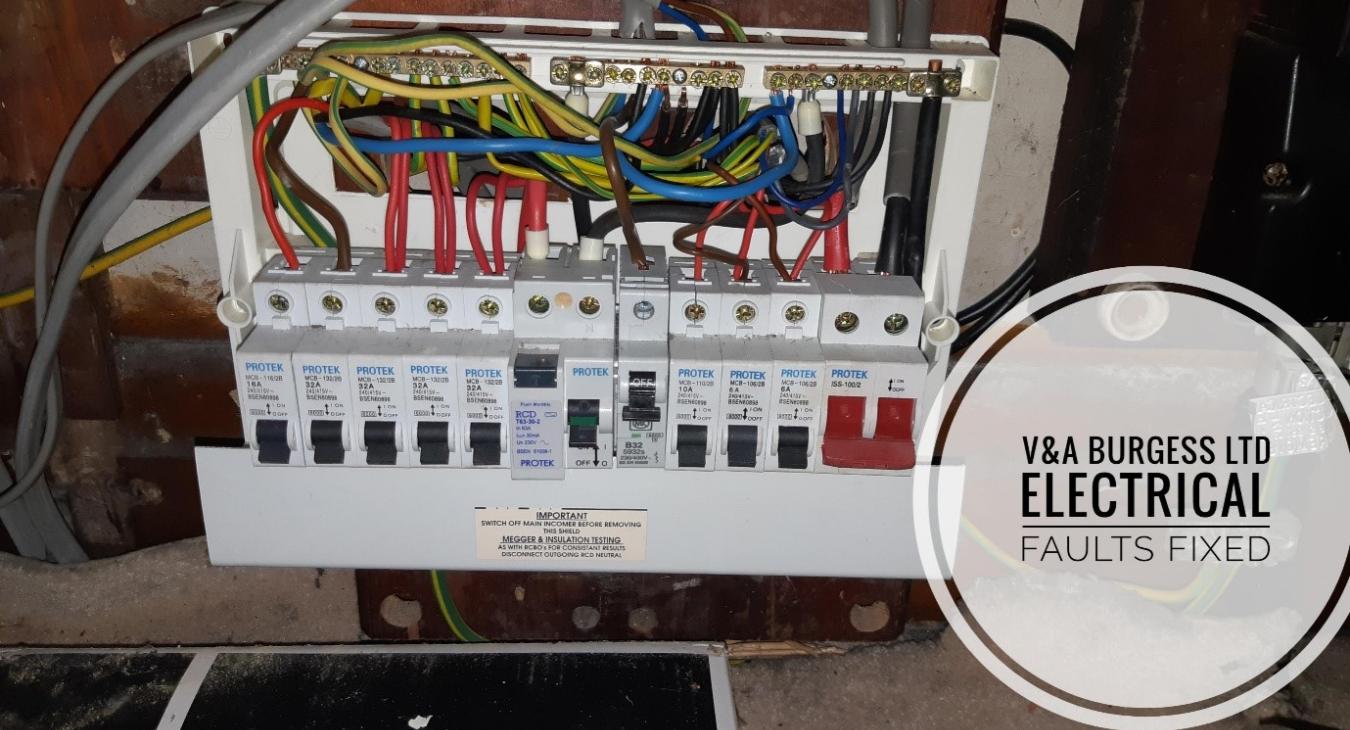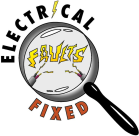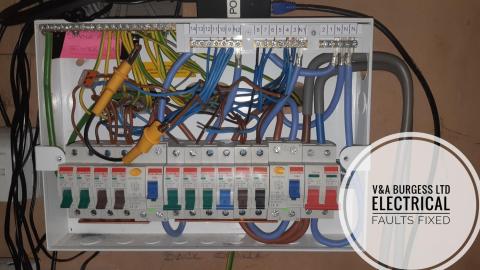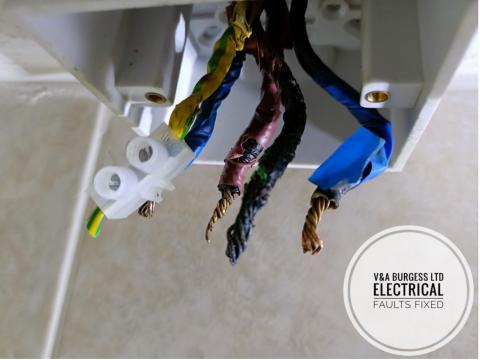
When it comes to electrical installations, FAULT FINDING is the process of discovering why an electrical system is not operating as it should be. There are a multitude of electrical faults that can cause an electrical system to fail from issues with the breaker panel, consumer unit, appliances through to the electrical accessories that are installed in the property.
When it comes to the type of faults there are several faults that can be caused by almost unlimited factors. These faults are as follows:
- Short Circuit
- Earth Fault/Ground Fault
- Insulation Failure
- Overloaded Circuit
- Component Failure
- Supply Issues
These faults can cause a trip switch problem power loss to the property, damage to cabling, electrical accessories or appliances. Without quick intervention from a qualified electrician, there can be more expensive problems to fix later on, further damage, the risk of fire or electric shock.
Back to top1) Short Circuit
A short circuit situation is where the Live conductors of the electrical system become unintentionally connected during normal operating conditions. That is, Line touched Neutral causing the circuit to bypass all the electrical equipment that may be connected and create a very low resistance path and a very high electrical fault current.
This large electrical fault current is normally detected and dealt with by the MCB (miniature circuit breaker) or RCBO (Residual Current Breaker with Overload) device. These two devices will spot when there is a large fault current flowing in an electrical circuit and disconnect the electrical circuit, normally with a bang!
Short circuits commonly occur where cable damage has occurred such as DIY mishaps or where appliances become faulty.
Back to top2) Earth Fault/Ground Fault
An earth fault occurs when there is an unintended path to earth from either the Line or Neutral of the electrical circuit. Earth faults can occur when cable damage is present, appliances go faulty, water ingress affects an electrical circuit or when someone is receiving an electric shock.
Earth Faults are dealt with by two devices. One is the RCD/RCB/GFCI/RCBO device. These devices detect small amounts of electrical current leaking to earth from the electrical circuit and are intended as electric shock protection devices. The other device is the MCB which will only deal with Line to Earth faults.
The RCD switches are the most effective at detecting earth faults and are now commonplace in many electrical installations throughout the world due to their ability to save lives.
Back to top3) Insulation Failure
An insulation failure is one where the cable insulating material is compromised. This generally leads to an earth / ground fault as mentioned above. Inside electrical cables there is a conductive metal (usually copper) which is surrounded by cable insulation and then generally a sheath. The insulation can become brittle with age forming microscopic cracks and contributing to electrical current leakage. The cable insulation can also drop in effectiveness significantly when moisture is present.
When the insulation on a cable fails, any RCD device will usually detect the missing electrical current and trip of the circuit or circuits which it protects.
Cable insulation is there to prevent metal wires inside a cable from touching each other causing short circuits and to protect against electrical current leakage.
Back to top4) Overloaded Circuit
An overloaded circuit is one that is carrying more than the intended electrical current. This occurs when, for example, too many electrical appliances are connected and used on the same electrical circuit. This is commonplace around Christmas or the holidays when there are generally more family members present in the home using more appliances than normal.
It is quite easy to overload a plug socket circuit when the washing machine, tumble dryer, kettle toaster and grill are all on at the same time. All these appliances have heating elements inside them which demand large amounts of electrical current. When there is too much demand, the circuit breaker at the fuse box or consumer unit will trip off and stop the flow of electrical current around the circuit.
This protects the electrical cables on the circuit from overload, overheating, catching fire or premature failure.
Back to top5) Component Failure
When electrical components fail, they can cause switches to trip or fuses to blow. This can lead you to believe that there is a faulty trip switch or general problem with the electrical circuit. Fault finding is necessary in order to determine the location of the fault and on which circuit it lies.
Back to top6) Supply Issues
Occasionally there may be issues in the street that are affecting your power supply. This could be that there are intermittent supply issues, blackouts, switches tripping or other anomalies. These types of faults are often difficult to pin down and can sometimes only be found when they are actually occurring.
An electrician is best placed to identify these faults and will be able to contact the relevant authority if there are supply issues in the street or beyond.
Back to top7) Do old fuse boards detect all faults?
So, when the power trips or the lights go out there is a good chance that you have a fault in the electrical installation in your home. This is detected by your consumer unit/fuse board and then the power is switched off to the installation automatically.
This is how everything should work.
Sometimes old fuseboards do not work as they should or do not detect certain types of faults like newer technology will. We will advise if your fuseboard/consumer unit should be changed.
When the power trips or the lights go off it is often because there is a fault. If the circuit breaker or RCD/RCB can be turned back on and stays on then everything may be ok. If it will not turn back on or will not stay on then it is likely there is a fault and you should call us to come and investigate.
Back to top8) How does an electrician find a fault?
We talk more about this here An electrician finds faults by using specialist test equipment, gathering as much information as possible from the property owner and by using knowledge and experience to quickly pin down the issue.
The fault may not be in an accessible location. Think of a damage cable or broken wiring junction that is underneath the floor in your home. It is generally possible to determine the location of the fault to within a few feet and should the issue not be accessible then further work may be required to create access and repair the problem.
Back to top9) How Much Does Fault Finding Cost?
There is generally no fixed cost for finding a fault as until investigative work begins, it can be difficult to say exactly WHAT the issue is, WHERE the issue is and HOW LONG it will take to locate the exact problem.
I appreciate that is not helpful to a worried homeowner with a faulty electrical system but bear with me.
It is usually possible to identify the TYPE of fault (electrically speaking), the ELECTRICAL CIRCUIT (sockets, lights etc) that the fault is on and a rough location of the fault within and hour.
Beyond this it depends greatly on access, number of locations to check and how quickly your electrician can work.
For instance, if you have a small home, there are no sockets working upstairs, ONLY the upstairs sockets are affected AND there is very little furniture or obstacles then finding the fault could potentially be done within an hour.
Conversely, if you have a large home where ALL the sockets are affected, there is lots of furniture blocking sockets, personal possessions in the way and there are many sockets to check then this could take considerably longer.
Most issues are resolved within an hour or two and as such the costs are kept down.
If the issue lies behind a plug socket instead of buried in the floor, then the repair is generally quicker, easier, and less expensive than lifting carpets and floorboards to repair wiring that is hidden.
Back to top10) If you are in the North West UK
We will always try to save you some money if possible so we may offer advice over the phone in the first instance. Some times it is necessary for us to attend your property to investigate the problem and we do this at all times of day and night as we are the local 24-hour electricians.
If all the lights and sockets have gone off but nothing has tripped then it may be a blackout. Call 105 first to find out if there is a problem in your area. If there is a burning smell then call us and we will come and investigate. Do not attempt to investigate the electrical problem yourself as this is potentially very dangerous.
If you need an emergency electrician in Liverpool, Widnes, or Surrounding area then we are here for you.
From swapping a light fitting to installing an oven we are happy to help with any problem big or small.
Contact us today.











